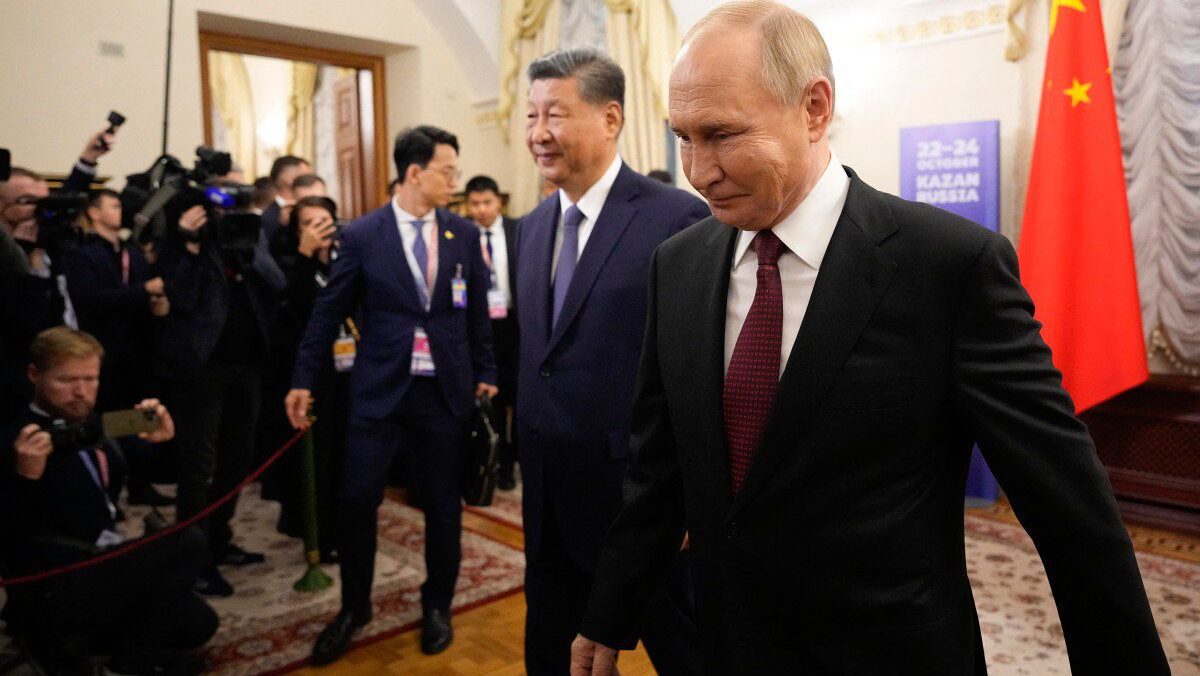
Russia’s President Vladimir Putin meets with Chinese President Xi Jinping on the sidelines of the BRICS summit in Kazan on October 22, 2024.
Photo: Alexander Zemlianichenko / POOL / AFP
The newly expanded BRICS alliance is meeting in Kazan, Russia, for its 16th summit this week, at the same time as the International Monetary Fund and the World Bank are gathered for their annual meeting in the U.S. capital. Challenging Western global dominance—including that of the U.S. dollar—is high on the BRICS agenda.
BRICS, originally founded in 2006 as a group for investment strategies for emerging nations by Brazil, Russia, India, and China, has since expanded and now includes South Africa and—since January 2024—Iran, Egypt, Ethiopia, and the United Arab Emirates. Argentina and Indonesia declined joining, while Saudi Arabia “has yet to confirm its membership,” the alliance said. An additional 30 nations have expressed interest in becoming members, including EU hopefuls Serbia and Turkey.
BRICS now comprises 45% of the world’s population and 35% of its economy, based on purchasing power—but it should be noted that China accounts for half of that purchasing power.
The 16th BRICS summit starts in Kazan, Russia today.
— Visegrád 24 (@visegrad24) October 22, 2024
BRICS' share of the global economy has risen to 36.8% since 2006, while the G7's share dropped to 29%.
New members like Egypt, Ethiopia, Iran, and the UAE are joining the bloc this year while Kazakhstan, Argentina and Saudi… pic.twitter.com/ghWXeeREp1
A total of 32 foreign delegations are expected. Of these, 24 will be represented at the level of heads of state and government. This includes all nine BRICS members to date, as well as several other countries that have expressed interest in membership. Notably, Turkey will be the first NATO member state to participate in a BRICS summit.
“This is an association of states that work together based on common values, a common vision of development and, most importantly, the principle of taking into account each other’s interests,” Russian President Vladimir Putin said.
For Putin, the BRICS summit is a way to show that the West’s attempts at isolating Russia have only encouraged him to build alliances elsewhere—with the Global South and East—in a stated effort to challenge the U.S. hegemony and build a multipolar world. Viktoria Panova, head of the BRICS Russian Expert Council, writes that the main purpose of BRICS is to “reform the international institutions which serve as the bedrock of the existing world order.”
Looming large in Western minds is the BRICS attempt at de-dollarization—replacing the U.S. dollar as the world’s foreign trade currency. The alliance itself denies that this is its goal, saying it simply wants to push for increased trade in local currencies:
The aim is not to replace the US dollar but to offer BRICS members greater flexibility in cross-border transactions, reducing reliance on the dollar for intra-group trade.
This process has already begun, with several countries—including Russia, Turkey, and Pakistan—agreeing to use the Chinese currency for Chinese imports. Even U.S. ally Saudi Arabia has declared its openness to accepting other currencies for its oil. Were the efforts to result in a de facto de-dollarization, it could send the U.S. into an immediate fiscal crisis.
Although the realization of those efforts may still be some time away, the alliance is in the process of developing a payment system alternative to the Western SWIFT network, which some Russian banks have been shut out of as part of the EU’s sanctions since 2022.
SWIFT provides a secure messaging system that enables international money transfers. It is used by thousands of financial institutions across more than 200 countries. Before the sanctions, Russia had the highest number of SWIFT users second to the U.S.
The BRICS Pay system, which is currently being developed by an international consortium, would allow the use of national currencies for international money transfers. Work is underway to create solutions for private customers as well as business customers and an “intergovernmental digital settlement system for cross-border securities transactions based on blockchain technology,” the Friedrich Naumann Foundation for Freedom reports.
Chinese Ambassador to Russia Zhang Hanhui told Global Times that as the Global South increases its share of the global economy, there is an “urgent need to promote reforms in the international financial and monetary system.”
This aims to enhance the representation and voice of developing countries and facilitate the continued diversification of the international monetary system, reflecting the pressing demands and common expectations of emerging economies and developing countries.
New member Ethiopia, participating in the summit for the first time, is hoping to leverage its membership to boost trade and improve infrastructure, Bahrukh Ygnakuchu, director of television and current affairs at Ethiopian Fana Broadcasting said:
“We need to explore how the New Development Bank can support our infrastructural projects and how BRICS can help us navigate the challenges and opportunities ahead.” But this is not just about taking from BRICS, he emphasized. “We believe Ethiopia has much to offer the bloc as well,” he said, highlighting Ethiopia’s extensive market and its increasing economic potential.
Because of increased interest from outside nations, the alliance has discussed creating a ‘partnership’ level for countries that want a collaboration, but not a full membership. “There’s debate within BRICS on how to balance expansion with maintaining efficiency,” Russian journalist Eugene Pavlov told South African IOL.
Lance Witten, editor-in-chief of IOL, points out that while BRICS could increase its global influence by allowing more member nations, increased diversity also brings the challenge of adjusting and harmonizing the varying political and economic systems.
On the BRICS summit agenda are also developing coordination with the G7 and G20 groups on global economic governance, information security and AI ethics, battling corruption, and the creation of a warning system for infectious disease and epidemic risks. While the group remains committed to transitioning to “a low-carbon and low-emission economy,” that goal will be implemented only as each nation’s economic conditions permit.
